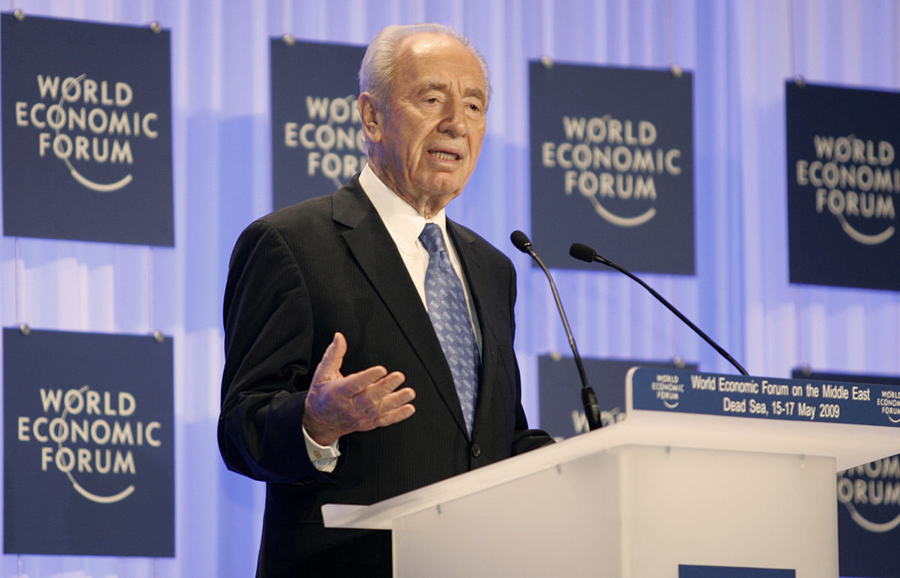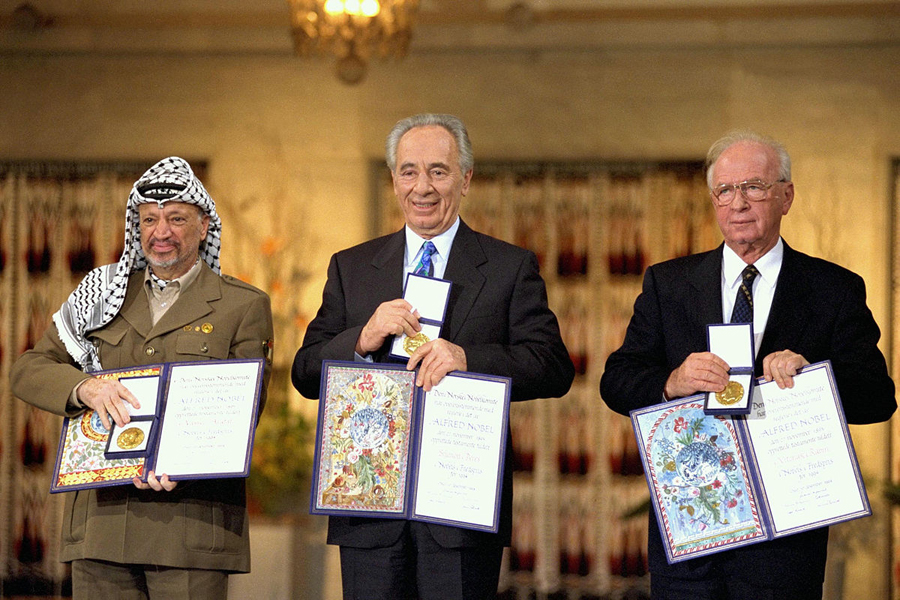 Shimon Peres was the ‘almost’ man of Israeli politics who was expected to win, but always lost. He was prime minister for a few months in 1977 after Yitzhak Rabin’s resignation and then for a similar period following Rabin’s assassination in 1995. His longest time in office as prime minister was in the national unity government with the Likud from 1984-86. He was expected to succeed Yitzhak Shamir in 1990 but then was thwarted by a last minute about-turn by Charedi politicians on orders from their rebbes. He was then expected to defeat Netanyahu in 1995, but the advent of Hamas’s suicide bombers put paid to that hope. Even when he stood for president in 2001, the walkover never happened and Moshe Katsav succeeded to the post instead. Peres only became president in 2007. Such an unprecedented string of disappointments would have crushed most politicians.
Shimon Peres was the ‘almost’ man of Israeli politics who was expected to win, but always lost. He was prime minister for a few months in 1977 after Yitzhak Rabin’s resignation and then for a similar period following Rabin’s assassination in 1995. His longest time in office as prime minister was in the national unity government with the Likud from 1984-86. He was expected to succeed Yitzhak Shamir in 1990 but then was thwarted by a last minute about-turn by Charedi politicians on orders from their rebbes. He was then expected to defeat Netanyahu in 1995, but the advent of Hamas’s suicide bombers put paid to that hope. Even when he stood for president in 2001, the walkover never happened and Moshe Katsav succeeded to the post instead. Peres only became president in 2007. Such an unprecedented string of disappointments would have crushed most politicians.
In his late 20s, Peres became deputy director-general of the Ministry of Defence and was instrumental in persuading France to supply arms to Israel amidst a widespread embargo – including the UK – in the run-up to the Suez war in 1956. He was also present at Sèvres when the collusion pact was agreed between Britain, France and Israel prior to the Suez campaign.
Peres was elected to the Knesset in the 1959 election as a candidate for Mapai, the forerunner of the Labour party. He aligned himself immediately with Ben-Gurion and sided with him when he broke with Mapai in 1965 to form Rafi.
Rafi was the party of the Mapai princes and included Moshe Dayan, Teddy Kollek, Chaim Herzog and many others who saw themselves as future leaders of the country. Peres essentially organised Rafi on Ben-Gurion’s behalf with little funding. He made the first contact with Menachem Begin’s Gahal to investigate whether they had common political interests. Although such contacts were low key, this was the precursor to the defection of this faction of the labour movement to the Right.
Rafi only achieved 10 seats in the 1965 election while Mapai triumphed. For Peres and Dayan this was a disaster since it severely reduced their opportunity of becoming a future prime minister. In 1968, Peres opted with the rest of the Rafi MKs to join the newly established Labour party. Ben-Gurion refused to return and led the rump of his party, now called the State List, which later became one of the founding components of the Likud.
Peres and Dayan led the hawkish wing of Labour and were strongly opposed by Abba Eban and Pinchas Sapir. They wished to integrate the West Bank into Israel’s economy and were often reluctant to offer constructive territorial concessions. This acute factionalism in Israeli Labour meant that there could be no meaningful peace initiatives. With the debacle of the Yom Kippur war in October 1973 with over 2500 dead and up to 8000 wounded, the Agranat Commission’s findings on culpability led to the resignations of Golda Meir and Moshe Dayan. In 1974 Yitzhak Rabin narrowly defeated Peres for the party leadership – and this initiated a 20 year-long rivalry.
As Defence Minister in the first Rabin government, Peres continued to be a standard bearer for the Right and adopted an accommodating position towards the West Bank settlers in cabinet discussions. This was integral to his ongoing war of political attrition against Rabin. His visit to the settlement of Sebastia in December 1975 was seen as a statement of his being amenable to the settlers’ demands.
Following the increase in oil prices, the Arab states used this weapon to isolate Israel. Many countries in the developing world now broke off diplomatic relations with Israel due to Arab pressure. With limited options, Peres paid a clandestine visit to apartheid South Africa in November 1974 and offered to sell the Chalet missile to Pretoria. While the Likud exuded no qualms of conscience, the Labour party did so with great reluctance – and Peres was its chosen candidate to implement this task.
Rabin’s attempts to cure the Labour party of corruption and sloth met with limited success – and he himself resigned when his wife was found to possess an unlawful foreign bank account in Washington. Peres took over as caretaker prime minister and went down to a resounding defeat by Menahem Begin in the 1977 election a few months later.
Peres continued as leader of the Labour party, welcoming the Camp David agreement and peace with Egypt. Yet a late comeback by Menahem Begin in the 1981 election allowed the Likud to pip Labour at the post. Begin’s second government was far more radical than his first and ended in the ill-fated invasion of Lebanon in 1982. During this period Peres turned from the Right to the Left and now aligned himself with Israeli doves. Following the massacre of Palestinians by Christian Phalangists in the camps of Sabra and Shatilla at the end of the war in Lebanon, 400,000 Israelis demonstrated in Tel Aviv – including Shimon Peres.
The electorate in 1984 was divided in their allegiance and this led to the ‘rotation government’ of a Labour-Likud coalition. Peres was prime minister from 1984-86 with Shamir succeeding to the post to serve a further two years. Peres proved to be a very capable leader, withdrawing the troops from Lebanon and fixing a badly damaged economy. It was also a period when Israel moved from a command economy, based on long-held socialist principles to a globalised capitalism – and Peres adjusted to this prospect with great ease.
During Shamir’s premiership, Peres forged the London agreement in 1987 with King Hussein during secret negotiations at the home of Lord Mishcon which was later vetoed by a critical Shamir. Peres expected to become prime minister once more in 1990 with the defeat of the Shamir government in a vote in the Knesset. Haredi backpedalling produced another failure for Peres, but this was a defeat one too many for Labour members and soon he was replaced by the more electable Rabin. As history records, the Labour government, led by Rabin with Peres as Foreign Minister, signed the Declaration of Principles – the Oslo Accord – with Yasser Arafat on the White House lawn in September 1993. Peres significantly appeared far more confident in clasping Arafat’s hand than the reticent and startled Rabin.
The peace process was perhaps the pinnacle of Peres’s career with his vision of a New Middle East and it earned him a Nobel Peace Prize together with Arafat and Rabin.
With his unexpected defeat in 1996 and the election of Netanyahu, Peres’s career seemed to be over. He held secondary positions within Labour and he and his Oslo colleagues were marginalised when Labour returned to power under Ehud Barak in 1999. Peres held the nondescript post of Minister of Regional Cooperation.
At the beginning of the 21st century, the al-Aqsa Intifada and its toll of Israeli victims, targeted by Islamist suicide bombers, persuaded the electorate to bring back Ariel Sharon to protect them. Peres was brought in as Foreign Minister, but he differed fundamentally with Sharon in that he wanted to negotiate with Arafat and to utilise his good relationship with him. Sharon, however, repeatedly commented that there could be no negotiations while the violence continued. A new generation of Labour politicians finally displaced the octogenarian Peres in 2005 and he lost its leadership for the last time.
Peres and Sharon were both disciples of Ben-Gurion and members of Mapai in the 1950s. While Peres led the right wing of Labour and eventually became a dove, Sharon became a founder of the Likud in 1973. Neither were attached to keeping Gaza and the West Bank for either ideological or religious reasons. Peres could therefore easily support the unilateral withdrawal from Gaza in 2005 and to leave Labour to join Sharon’s new party, Kadima.
In 2007 he left formal party politics to finally become president. His inspiring and confident statements in the depths of adversity chimed with Diaspora and western sentiments, but clearly grated on the nerves of the Likud and parties on the far Right. After seven years at the helm, he retired from the presidency in 2014.
Peres was a cultured man who spoke several languages and wrote poetry. Like Abba Eban, he was seen as ‘foreign’ and, for some, untrustworthy. Yet he managed to survive in the bear-pit of Israeli politics and to weather every twist and turn of fortune. His charm and sophistication will be missed in diplomatic circles. His transformation from Szymon Perski from Vishnyeva in Belarus into Shimon Peres, builder of the Hebrew republic, is a reflection of how the Jews have moved from the margins of history to its mainstream after two millennia of dispersion. Israel has lost a unique voice.
By Colin Shindler, an emeritus professor at SOAS, University of London


